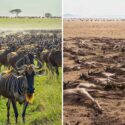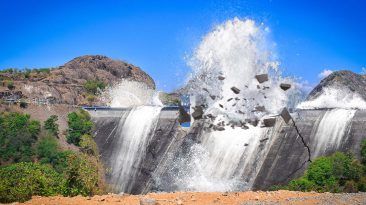The war in Ukraine has altered the lives of millions. And has sent prices for goods like oil and natural gas skyrocketing around the world. But the worst may be yet to come. Could the war prevent Ukraine from harvesting food this year? How important are Ukraine and Russia to the global food supply? And how could this lead to further social unrest?
Ukraine has been called the breadbasket of the world. Together with Russia, the two nations account for about 30% of global wheat exports. Not only that, but 12% of all the calories consumed around the world. Yet, since the beginning of Russia’s invasion in February, both countries have been effectively cut off from exporting food.
Millions of Ukrainians have been forced to flee their homes or join in the defense effort. The conflict has also physically disrupted many of the country’s essential fuel supply and trade routes. And Russia? Russia’s under heavy economic sanctions that make exporting food enormously difficult. So with the timeline to de-escalation still unclear, could the world be on the verge of global hunger?
Ukraine is one of the largest exporters of wheat, corn and sunflower seeds. And this year, Ukrainian harvests are estimated to be down about 30%. And right away, this would cause a ripple effect around the world. Some places would be more directly affected by this than others. Particularly countries in Northern Africa and Central Asia. If you live in Armenia, Mongolia or Eritrea, you could see your wheat supply completely cut off.
And finding another source wouldn’t be so easy. You’d now be forced to compete with more economically powerful nations that can afford to pay higher prices. Turkey, Iran and Bangladesh import over 60% of their wheat from Russia and Ukraine. And Egypt depends on these countries for a staggering 80% of its supply.
The price of wheat is already up 69% within the last year. And with an ongoing effect on the supply chain, those prices could continue to climb. The longer the war continues, the more serious this wheat situation gets. These higher prices wouldn’t be limited to just wheat. Livestock around the world consumes a lot of grain. Animal feed prices would skyrocket. And because of that, meat all over the world would start getting pricey too.
And it gets worse. Russia and Belarus are two of the largest exporters of potash, which is an important ingredient in fertilizers. Now both of those countries are under sanctions. Russia for starting the war, and Belarus for supporting Russia’s aggression against a sovereign country. All this means that Brazil, which depends on these two countries for about half of its potash supply, would have to cough up more cash too.
So you’d start to see the price of your favorite coffee, soy and beef products climbing higher and higher. Disruption to the fertilizer trade would have enormous effects beyond just rising costs. This could seriously threaten the global food system. Farmers all around the world depend on fertilizers to grow their food. Without it, you’d see massive declines in food production of all kinds. And with that, we’d now be in really dangerous territory.
Countries would begin to limit their food exports in favor of making sure there is enough supply to feed their own citizens. In many places, there simply wouldn’t be enough money or supply to guarantee this. For potentially millions of people, bread being expensive would no longer be the core issue. Now they might not have any bread at all.
That could lead to social and political upheavals. Many countries subsidize bread costs to avoid this very circumstance. Riots would break out and many governments would violently crack down on their own people to maintain order. And organizations that normally rush to aid in these moments would be in trouble too.
Before the war, the United Nations World Food Programme relied on Ukraine for half of its grain supply to feed starving people around the world. Now, around 45% of Ukrainians are worried about finding enough food for themselves. In times of stability, having such an interconnected global economy can provide people with so many things.
But when something like Russia’s invasion of Ukraine disrupts that, it reveals how fragile this system is. Our food supply chains could be damaged for years to come. And things could still get worse. Like if Russia launches a nuke.
Sources
- “What Is Happening in Ukraine and Why Is Russia Invading?”. James Hookway and Yaroslav Trofimov. 2022. wsj.com.
- “Ukraine War Threatens To Cause A Global Food Crisis”. Jack Nicas. 2022. nytimes.com.
- “Russia Ukraine is Causing a Global Food Crisis – TLDR News”. TLDR News Global. 2022.
- “Video shows Europe’s largest food warehouse on fire after ‘deliberate’ Russian attack”. Hannah Brown. 2022. euronews.com.
- “War In Ukraine Could Plunge World Into Food Shortages”. Joel K. Bourne, JR. 2022. nationalgeographic.com.



























